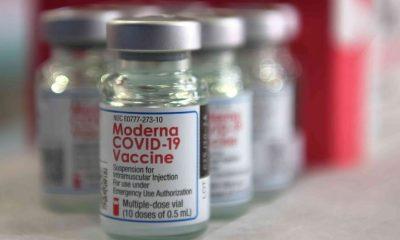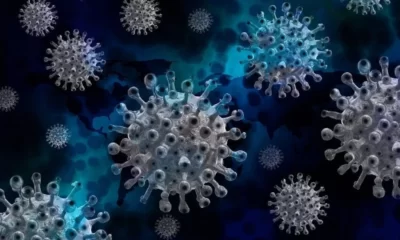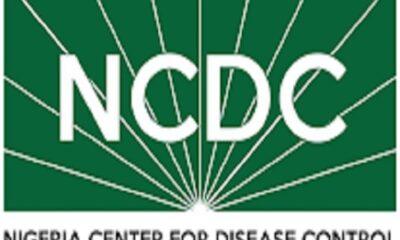Health
Restrictions Reimposed As Virus Resurges In Asia
Published
3 years agoon
By
Editor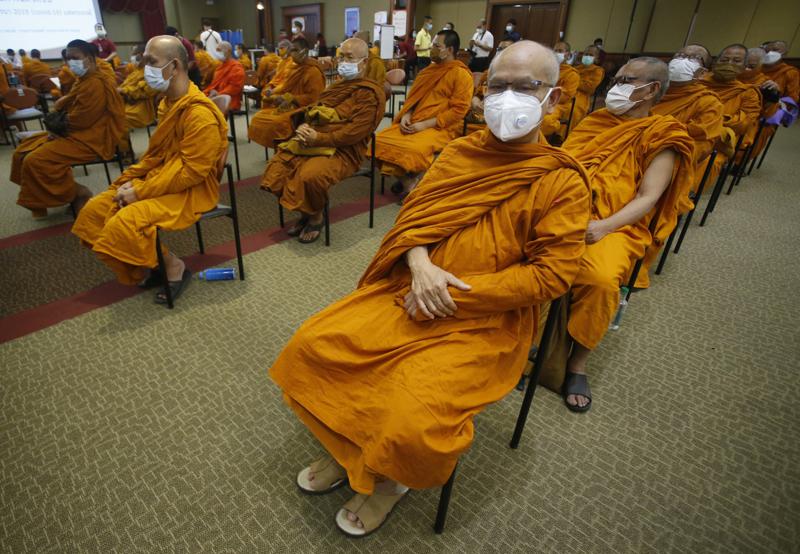
Taxi drivers are starved for customers, weddings are suddenly canceled, schools are closed, and restaurant service is restricted across much of Asia as the coronavirus makes a resurgence in countries where it had seemed to be well under control.
Sparsely populated Mongolia has seen its death toll soar from 15 to 239, while Taiwan, considered a major success in battling the virus, has recorded more than 1,200 cases since last week and placed over 600,000 people in two-week medical isolation.
Hong Kong and Singapore have postponed a quarantine-free travel bubble for a second time after an outbreak in Singapore of uncertain origin. China, which has all but stamped out local infections, has seen new cases apparently linked to contact with people arriving from abroad.
The resurgence hasn’t come close to the carnage wrought in India and parts of Europe, but it is a keen reminder that the virus remains resilient, despite mask mandates, case tracing, mass testing and wider deployment of the newest weapon against it — vaccinations.
That’s setting back efforts to get social and economic life back to normal, particularly in schools and sectors like the hospitality industry that are built on public contact.
In Taiwan, the surge is being driven by the more easily transmissible variant first identified in Britain, according to Chen Chien-jen, an epidemiologist and the island’s former vice president, who led the highly praised pandemic response last year.
READ ALSO: China Approves Another COVID-19 Vaccine For Emergency Use
Complicating matters are some senior citizens who frequent slightly racy “tea salons” in Taipei’s Wanhua neighborhood. They accounted for about 375 of the new cases as of Tuesday, Chen said. The tea shops are known for providing adult entertainment with singing and dancing.
“These seniors, when they go to these places, want to keep it veiled,” Chen said. “When we are conducting the investigation, they may not be honest.”
In Wanhua, normally a bustling area with food stalls, shops and entertainment venues, the Huaxi night market and historic Longshan Buddhist temple are closed.
Kao Yu-chieh, who runs a breakfast shop in the area, said business is down at least 50% since last week.
Cab driver Wang Hsian Jhong said he hasn’t had a customer in three days. “Everyone is affected. This is a Taiwan-wide problem. We have to get through it,” he said, puffing on a cigarette on a street in Wanhua.
The island has shut all schools and restrictions previously only in the Taipei area were expanded island-wide Wednesday: Restaurants, gyms and other public venues were closed, and gatherings of more than five people indoors and more than 10 people outdoors are banned.
Taiwan President Tsai Ing-wen has sought to reassure a public that is reverting to panic-buying and shunning public places.
READ ALSO:China’s Economic Growth Surged To 18.3% As Activities Revived
“We will continue to strengthen our medical capacity,” Tsai said, adding that vaccines are arriving from abroad.
Malaysia unexpectedly imposed a one-month lockdown through June 7, spooked by a sharp rise in cases, more-infectious variants and weak public compliance with health measures.
It was the second nationwide lockdown in just over a year and came after the country’s cases shot up fourfold since January; it’s now more than 485,000 and 2,040 people have died, a sum also up by four times from January. Interstate travel and social activities are banned, schools are shut, and restaurants can provide only takeout service. The government has warned that hospitals have almost maxed out their capacity to take new coronavirus cases.
Singapore has imposed stringent social distancing measures until June 13, restricting public gatherings to two people and banning dine-in service at restaurants.
That came after the number of coronavirus infections of untraceable origin rose to 48 cases in the past week, from 10 cases the week before. Singapore had previously been held up as a role model after keeping the virus at bay for months.
Schools moved online after students in several institutions tested positive. Wedding receptions are no longer allowed, and funerals are capped at 20 people.
For wedding planner Michelle Lau, at least seven clients either canceled or postponed weddings meant to take place over the next month. Other couples have opted for a simple ceremony without a reception, she said.
Janey Chang, who runs two Latin dance studios in Singapore, says that the tougher restrictions have drastically reduced class size.
“We are taking on fewer students, but the costs such as rent remain the same,” Chang said. “Whether we can continue to operate is highly dependent on the number of coronavirus cases.”
Hong Kong has responded to fresh outbreaks by increasing the quarantine requirement from 14 to 21 days for unvaccinated travelers arriving from “high-risk” countries, including Singapore, Malaysia and Japan, and, farther afield, Argentina, Italy, the Netherlands and Kenya.
China has set up checkpoints at toll booths, airports and railway stations in Liaoning province, where new cases were reported this week. Travelers must have proof of a recent negative virus test, and mass testing was ordered in part of Yingkou, a port city with shipping connections to more than 40 countries.
READ ALSO: Countries Worldwide Hit New Records For Virus Cases, Deaths
Thailand reported 35 deaths, the highest since the outbreak started, on Tuesday, and an additional 29 on Wednesday. That brought its number of fatalities to 678, of which 584 have been reported in the latest wave. About three-quarters of Thailand’s more than 116,000 cases have been recorded since the beginning of April.
Thailand had about 7,100 cases in all of last year in what was regarded as a success story.
The resurgence has posed difficult choices for governments, particularly in poorer nations where lockdown restrictions can increase financial suffering for those already living on the edge of starvation.
In the Philippines, President Rodrigo Duterte has eased a lockdown in the bustling capital and adjacent provinces to fight economic recession and hunger but has still barred public gatherings this month, when many Roman Catholic festivals are held.
COVID-19 infections started to spike in March to some of the worst levels in Asia, surging beyond 10,000 a day and prompting Duterte to impose the lockdown in and around Manila in April. The Philippines has reported more than 1.1 million infections with 19,372 deaths, though the surge has begun to ease.
Health Secretary Francisco Duque III said the partial resumption of economic activities, increased noncompliance with restrictions and inadequate tracing of people exposed to the virus combined to spark the steep rise in infections.
Experts said the delivery of vaccines, however delayed and small in amount, also fostered false confidence the pandemic might be ending.
(AP)
You may like


Prepare For Next Pandemic, UN Chief Tells World


New Strain Of COVID Could Be Causing Strange Night-time Symptoms As Cases Spread


Why Some People Don’t Get Sick From COVID-19 Infection — Study


Japan To Treat COVID-19 As Common Flu


Concerns Rise Amid Surge Of COVID Variants Globally


JUST IN: New COVID-19 Variants Not In Nigeria – NCDC

By Silver Yeibake
Autism, commonly known as Autism Spectrum Disorder (ASD), is a neurodevelopmental disorder that affects communication, social interaction, and behavior. Autism is referred to as a spectrum condition since it can manifest in a variety of symptoms and abilities. While the actual cause of autism is unknown, evidence suggests that genetic and environmental factors interact to influence its development.
The risk factors include a sibling with autism, advanced age of parents, exposure to certain air pollutants and pesticides before birth, extreme prematurity, mothers with diabetes, immune system disorders or obesity, any difficulty with delivery leading to deprivation of oxygen to the baby’s brain, fever during pregnancy, lack of certain vitamins minerals during pregnancy, and certain genetic conditions, such as Down, fragile X, and Rett syndromes.
“Risk factors can not on their own cause a disease. However, they can increase the likelihood of that disease in a person.”
It is important to know that contrary to trending claims online, there is no scientific or medical evidence that vaccines or consumption of sugar are risk factors for autism.
READ ALSO: Kidney Stones: What You Need To Know
Autism is defined by difficulties in social interaction and communication. Individuals with autism may struggle to grasp social cues, maintain eye contact, and engage in typical back-and-forth conversations. Some people may also engage in meaningless, repetitive actions, such as hand-flapping or rocking, and have strong interests in specific areas.
It is essential to remember that autism is a lifelong diagnosis, but with early intervention and adequate care, people with autism can live fulfilling lives.
Autism treatment frequently includes behavioral therapy, speech therapy, occupational therapy, and social skills training. Each individual with autism is unique, thus interventions should be tailored to meet their personal needs and strengths.
In spite of the difficulties that autism can cause, many people with autism possess unique talents and abilities. Some people may succeed in fields such as music, art, mathematics, or programming, thus it is important for society to acknowledge and honor the qualities and achievements of people with autism.
In summary, autism is a complicated and diverse disorder that affects individuals in various ways. By raising autism knowledge, understanding, and acceptance, we can build a more inclusive society in which people with autism can thrive and attain their full potential.
Dr. Yeibake, Weriwoyingipre Silver.
Senior Registrar,
Faculty Of Pediatrics,
WACP
Health
Don Confirms ‘Zobo’ As Antihypertensive Therapy
Published
2 months agoon
March 10, 2024By
Editor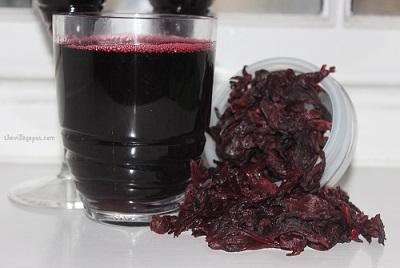
The Deputy Vice Chancellor, University of Nigeria Enugu Campus, UNEC, Prof. Daniel Nwachukwu, after research findings and clinical trials in both animals and human, has confirmed that Hibiscus Sabdariffa, popularly called ‘zobo’ drinks, has all the curative potentials as an antihypertensive therapy.
Nwachukwu, who is a Professor of Cardiovascular Physiology in the university, stated that the antihypertensive effectiveness of the Hibiscus Sabdariffa (zobo) was comparable to those of known antihypertensive drugs that are popular in the retail pharmacies, adding that zobo’s availability, cheapness and absence of side effects make it attractive as an alternative therapeutic agent in mind to moderate hypertensive subjects.
He however cautioned that care should be applied to avoid abuse in the consumption of Hibiscus Sabdariffa (zobo), adding that the therapy could interfere with some anti-malaria drugs while its high dose was also reported to have toxic effects on the liver and kidney.
READ ALSO: How Airline Pilots Fell Asleep Mid-flight – Safety Agency Reveals
Nwachukwu’s discoveries were contained his 201st Inaugural Lecture of the University of Nigeria with the topic “The Marriage Between the Cardiovascular System and Hibiscus Sabariffa: Let no One Put Asunder,” delivered at the moot court hall, Law faculty of the University of Nigeria, Enugu campus.
The DVC warned that Hibiscus Sabariffa consumption is not recommended for persons with low blood pressure because of its well established hypotensive action, advising that during combined therapy with antihypertensive drugs, the blood pressure, BP, must be carefully monitored.
He recommended that industrialists and investors should support large scale production of Hibiscus Sabariffa beverage and its distribution to rural communities in Nigeria, particularly since the raw materials (Hibiscus Sabariffa calyx and water) are cheap and readily available.
READ ALSO: Man Stabs Two Women To Death At A Mexico Varsity
According to Nwachukwu, “This lecture is intended to draw the public attention to our research efforts and unveiling the antihypertensive ability of Hibiscus Sabariffa which is called zobo in our common parlance. What we used for our studies was the same concentration as the locally produced zobo, and we found out that it exerted significant antihypertensive ability, in some cases even higher than the antihypertensive drugs and also did combination therapy with other antihypertensive drugs.
“What is significant is that this zobo is within us, it’s very cheap and it does not have any side effects compared to other antihypertensive agents. The raw material is just to buy zobo, prepare it under hygienic conditions, boil water and put it, sieve it and drink. It may have a sour taste but we do not encourage people to add things like pineapple or sugar in order to make it sweet, because once you do that, you are diluting or reducing its antihypertensive effectiveness.
“We have demonstrated it, both in animal studies and in humans. We are the first to do clinical trials, using mild to moderate antihypertensive Nigerians and we found it very useful. Some of the results show that one can actually use it and we equally saw that you can use it to prevent even diabetes from occurring because it reduces the rise in glucose level.”
READ ALSO: Adolescent Girls Face Risks Of Sexual Violence – UNICEF
Vice Chancellor of the University, Professor Charles Igwe while summarizing the lecture said that the lecture was in three dimensions; one on health grounds, another in academics and the third an economic value.
“Its economic in the sense that we can also begin to use what God has given us to make money. Maybe because God gave us everything in abundance in this country, we don’t recognize the simplest things God gave us in our environment. Therefore, what we are saying is that we should begin to, at all these pure water productions and incorporate zobo production so as to make money out of it.
“The university has made its contribution through our laboratories and it’s now left for the business community and the industries to come and buy into it and start widening it and make it very economic,” Igwe suggested.
Vanguard

By Silver Yeibake
Hi, did you know that Tuesday 12th March, 2024 is world Glaucoma day?Kindly avail yourself of this opportunity to learn about this important health issue as presented below:
Glaucoma is a dangerous eye disorder that damages the optic nerve, causing visual impairment or permanent blindness if not treated.
The optic nerve transmits visual information from the eye to the brain. Damage to this nerve might cause gradual visual loss that is not immediately obvious.
Worldwide, this disease affects 67 million people and contributes 6.7 million of blindness in this population. Glaucoma is the leading cause of blindness in the world.
The total number of cases is expected to increase to 111 million by 2040. Males are slightly more affected than females.
One of the basic causes of glaucoma is an increase in intraocular pressure (pressure within the eyeball), which can eventually damage the optic nerve (the nerve that makes seeing possible). This increase in pressure could be caused by an accumulation of aqueous humor, the fluid that nourishes the eye.
FROM THE AUTHOR: Food Poisoning: What You Need To Know
There are several forms of glaucoma, including open-angle glaucoma, angle-closure glaucoma, normal-tension glaucoma, and secondary glaucoma, each with unique characteristics and treatment choices.
Some of the risk factors for glaucoma include sustained elevation of intraocular pressure, family history of glaucoma, race (African, Asian), short-sightedness, long-sightedness, age over 50, previous eye injury or surgery, hypertension, diabetes mellitus, migraines, and prolonged steroid therapy.
Glaucoma symptoms may not appear until the problem has advanced sufficiently, therefore regular eye checks are essential for early detection. Blurred vision, eye pain, nausea, and light halos are some of the most frequent glaucoma symptoms. However, these symptoms might be mild or readily misinterpreted as other eye problems, emphasizing the significance of regular eye examinations.
Glaucoma treatment tries to reduce intraocular pressure and protect the optic nerve from further damage. This can be accomplished using a variety of approaches, including prescription eye drops, oral medicines, laser therapy, and surgical procedures. Treatment options are determined on the kind and severity of glaucoma, as well as personal characteristics such as overall health and medical history.
To summarize, glaucoma is a serious eye disorder that requires timely diagnosis and treatment to prevent irreversible vision loss. Regular eye examinations, early detection, and commitment to treatment plans are critical for protecting vision and eye health in glaucoma patients.
Thank you.
Dr. Yeibake, Weriwoyingipre Silver, a
Senior Registrar, Faculty Of Pediatrics, West Africa College of Physician (WACP), writes from Yenagoa, Bayelsa State.

PHOTOS: FCCPC Raids Supermarkets In Port Harcourt, Seizes Underweight, Re-bagged Rice

Outrage As Kingsmen Flogged Anambra Man To Death [VIDEO]

Man Declared Wanted For Stabbing Wife To Death, Attempted Murder of Two Children
Trending

 Entertainment3 days ago
Entertainment3 days agoBridesmaids’ Dance At Wedding Causes Stir On Social Media [VIDEO/PHOTOS]

 Politics5 days ago
Politics5 days agoEdo Guber: Akoko-Edo PDP Leaders Meet In Igara, Describe Ighodalo, Ogie As ‘Perfect Match’

 Metro3 days ago
Metro3 days agoVIDEO: ‘UNN Lecturer’ Caught Pants Down With Married Student

 News1 day ago
News1 day agoDrama! Supporters Of Yahaya Bello Perform Rituals to Prevent His Arrest By EFCC [Video]

 News2 days ago
News2 days agoVIDEO: Force PRO Orders Arrest Officers Caught On Video Bashing Driver’s Car

 Headline2 days ago
Headline2 days agoDrama As Women Fight Dirty, Breasts Fall Out During Spring Break Outing In US [PHOTOS/VIDEO]

 News4 days ago
News4 days agoOutrage As Chinese Supermarket In Abuja Denies Nigerians Entry

 News3 days ago
News3 days agoIGP, Jonathan Disagree Over State Police

 Entertainment2 days ago
Entertainment2 days agoNollywood Actor, Zulu Adigwe Is Dead

 Metro1 day ago
Metro1 day agoEdo Cultists Kill Rival In Daughter’s Presence, Abandon Getaway Car


